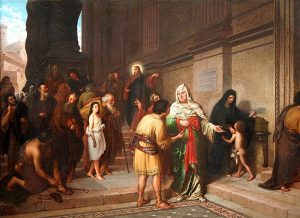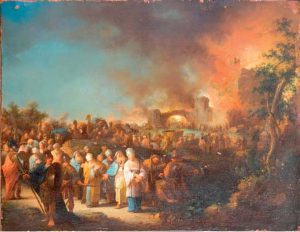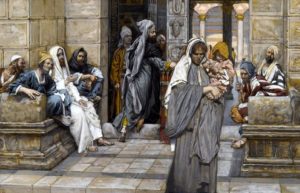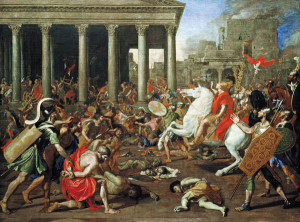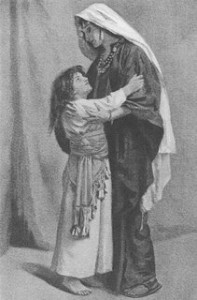Thoughts on Sunday’s Lessons for Nov. 17, 2024 (Pentecost 26B/Proper 28)
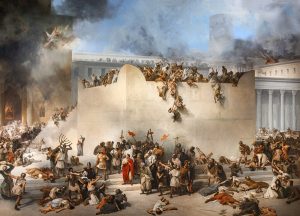
The destruction of the temple of Jerusalem (1867), oil painting on canvas by Francesco Hayez (1791-1882). Gallerie dell’Accademia, Venice, Italy. (Click image to enlarge.)
First Reading (Track One): 1 Samuel 1:4-20
At the beginning of the season after Pentecost back in June, we read about the Prophet Samuel, who followed God’s commands to find the young shepherd David, who would become Israel’s king. Now, as the Pentecost season nears its end, we return to the first book of Samuel to hear the story of Samuel’s mother, Hannah, who was anguished and suffered verbal abuse because she couldn’t bear a child. She opened her heart in prayer and discovered that God remained with her in her time of trouble and pain. Her prayers were answered. She found joy, giving birth to Samuel, who became the last of the great judges who governed Israel before the time of its kings.
First Reading (Track Two): Daniel 12:1-3
The long Pentecost season is drawing to its close. In two weeks, Advent will begin, starting a new Lectionary year. Sunday’s readings foreshadow a central theme of Advent: our hope of resurrection and new life. Our Track Two first reading is from the book of Daniel. Its narrative reflects Israel’s persecution under Greek rule in the 2nd century BCE. This reading begins Daniel’s lengthy “apocalyptic” vision – a genre similar to Revelation – that envisions ultimate triumph. It introduces the idea of a general bodily resurrection of all the dead, the first time that this theological concept is raised in the Hebrew Bible.
Psalm (Track One): 1 Samuel 2:1-10
In place of a psalm, this alternative Track One reading steps forward a page or two in 1 Samuel to sing the prayer of Hannah, celebrating her joy at the birth of her child Samuel. These words of hope and strength clearly foreshadow the Song of Mary, the Magnificat, that the mother-to-be of Jesus sings in Luke’s Gospel. Both Hannah’s and Mary’s prayers celebrate the God who lifts up the lowly and the poor while casting down the rich and powerful. But Mary won’t echo the strong words of vengeance against enemies that we hear in Hannah’s song.
Psalm (Track Two): Psalm 16
Just as the first reading from Daniel promises a heavenly reward to those who remain faithful, Psalm 16 reassures the people that God will not abandon those who always follow God. But, the Psalmist goes on, a different, harsher fate awaits the unfaithful, those who follow other gods: They may see their troubles multiplied, and God will not so much as speak the names of their gods. God will never abandon those who remain faithful, though: The hearts of the faithful will be glad and their spirits will rejoice.
Second Reading: Hebrews 10:11-14 (15-18) 19-25
We come to the end of our seven-week journey through the letter to the Hebrews. This passage concludes its lengthy narrative describing Jesus as a great high priest who offered himself as one sacrifice for all times, superior to the sacrifices by the priests in the Temple of Jerusalem, who had to perform sacrifices again and again. Echoing themes in Sunday’s other readings, this passage calls on its audience to hold fast without wavering, provoking each other to love and good deeds, encouraging one another all the more as they see the Day of the Lord approaching.
Gospel: Mark 13:1-8
Jesus’s words about wars, earthquakes, and famines in Sunday’s Gospel give us a taste of the apocalyptic prophecies that will draw our attention through Advent. These verses follow immediately after last week’s account of Jesus watching the poor woman giving her last two coins to the Temple treasury. Jesus, still angered by the hypocrisy of the scribes, utters his own version of an apocalypse, declaring that the Temple will be destroyed, thrown down, not one stone left upon another. As Mark’s Gospel now turns toward the cross, these words will soon be held against Jesus before the Temple’s high priest.

